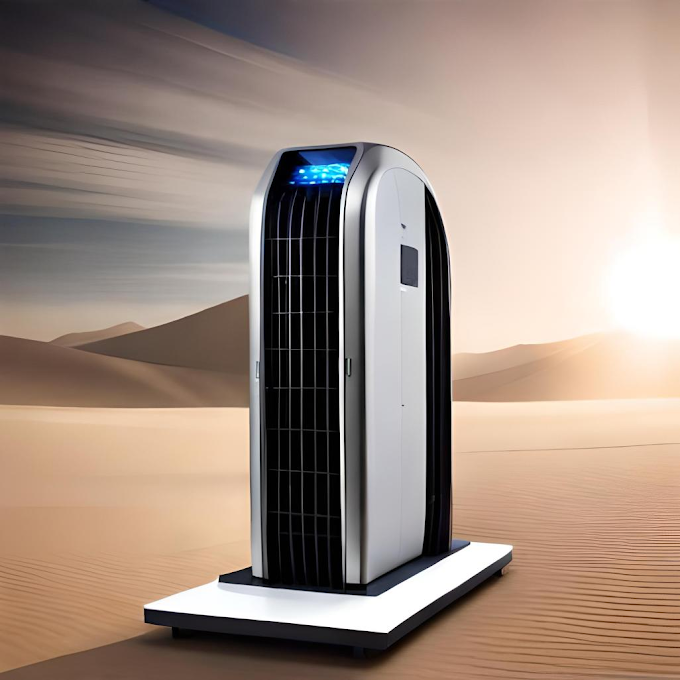Stay Cool and Save Energy with an Air Cooler: A Comprehensive Guide
What is an air cooler?
An air cooler, also known as an evaporative cooler, is a device designed to cool ambient air using the natural process of evaporation. It is an eco-friendly and cost-effective alternative to traditional air conditioning systems. Air coolers are commonly used to relieve heat in dry and hot climates. It has a water tank, a cooling pad, a fan and a pump.
The cooling pad is soaked in water and when the fan draws air from the surroundings, it passes through the wet cooling pad. As air passes through the pad, the water evaporates, removing heat from the air and lowering its temperature. Cool air is then circulated back into the room, providing a refreshing and cooling effect.
Types of Air Coolers:
1. Desert Air Coolers: These are large sized air coolers suitable for spacious spaces such as living rooms, halls or outdoor areas. They have a high cooling capacity and can significantly reduce the temperature.
2. Room Air Coolers: These are compact air coolers designed for small spaces like bedrooms or offices. They are portable and offer localised cooling
Source of Power:
Air coolers usually run on electricity. They must be connected to a power source to run fans and pumps.
Number of Blades:
The number of air cooler fan blades may vary. The more blades a fan has, the greater the air delivery and cooling efficiency.
Product dimensions:
Air coolers come in various sizes from small and portable units to large models. The dimensions of an air cooler depend on its type and cooling capacity.
Voltage description:
Air coolers usually operate on standard household voltage, which is usually 220-240 volts. However, it is essential to check the specific voltage requirements stated by the manufacturer.
Energy consumption:
The energy consumption of an air cooler depends on its size, cooling capacity and speed settings. It is measured in watts (W). Energy-efficient models are designed to consume less energy while providing optimal cooling.
Speed:
Air coolers often come with multiple speed settings to adjust airflow to personal preferences and room needs. Higher speed settings provide more cooling, but they can use more power.
Cleaning:
The sweep of an air cooler refers to the horizontal swing range of air delivery. It determines how far cool air can reach within a room.
Air Delivery:
Air delivery refers to the amount of air circulated by the air cooler in a given period of time, usually measured in cubic feet per minute (CFM). High air supply ensures fast cooling and good air circulation.
Special Features:
Air coolers come with several special features, including:
1. Remote Control: Some models have a remote control for convenient operation from a distance.
2. Timer: A timer allows you to set a specific time for the air cooler to run and turn off automatically.
3. Humidifier function: Some air coolers can also act as humidifiers, adding moisture to the air for added comfort.
Mount Type:
Air coolers are primarily designed as freestanding units. However, some models come with the option of wall-mounting or ceiling installation for space-saving purposes.
Controller Type:
The type of controller depends on the model. Air coolers may have manual knobs or buttons, touch controls or a digital display panel to monitor settings and temperature.
Ingredients:
Air coolers are usually manufactured Durable and lightweight materials such as plastic, ABS or metal. The choice of material affects the overall durability and portability of the unit.
Where should I set up an air cooler?
Air coolers should be placed near open windows or doors for intake of fresh air and proper ventilation. Ideal location where cool air can easily enter the room. It is essential to avoid placing obstructions in front of the air cooler that may obstruct airflow.
Advantages and Disadvantages of Air Cooler:
Benefits:
- Energy-efficient and cost-effective cooling solutions.
- Environmentally friendly, as they do not use harmful refrigerants.
- Easy to maintain and clean.
- Can be used both indoors and outdoors.
- Provides natural and fresh air circulation.
Disadvantages:
- Effective in dry climates but less effective in humid environments.
- Cooling capacity may be limited at extremely high temperatures.
- Depends on access to fresh air and proper ventilation.
- Regular refilling of the water tank is required.
- May increase the humidity level in the room.
Conclusion:
Air coolers are an excellent choice for cooling in hot and dry climates. By understanding the different types, features and considerations, you can choose the right air cooler that suits your needs and provides a comfortable and refreshing environment.
FAQs:
Q: Can I use the air cooler in humid weather?
Answer: Air coolers can provide some cooling effect in humid climates, but they are most effective in dry regions. At high humidity, cooling efficiency may decrease.
Q: Can I use the air cooler with the windows closed?
Answer: Air coolers work by drawing fresh air from outside and circulating it inside. For best performance, a window or door partially open is recommended for proper ventilation and air exchange.
Q: How often should I clean the air cooler?
Answer: It is recommended to clean the air cooler at least once every two weeks to prevent dust and mineral build-up on the cooling pad and water tank. Regular maintenance ensures good performance and durability.
Q: Can I sleep with the air cooler on?
Answer: Yes, air coolers are generally safe to use while sleeping. They provide a comfortable breeze and can help maintain a cool temperature at night. However, for some people, fan noise may disturb their sleep.
Q: Can an air cooler be used outside?
Answer: Yes, certain air coolers are designed for outdoor use. These models are usually larger and have higher cooling capacity to accommodate open spaces or outdoor events.
Q: Does the air cooler make noise?
A: Air coolers generate a certain amount of noise due to fan operation. However, modern models are designed to reduce noise levels and provide quieter operation than traditional air conditioners.








